Because large objects placed too close to the road can create a hazard and a liability for the property owner there is an enforceable road right-of-way. The normal rule is that the road right-of-way extends thirty-three feet from the center of the road. However, please call our office (989.743.2228) before starting a project, as there are exceptions for some roads.
It is the responsibility of the property owner to obtain a culvert from a private vendor. In the instance that there is a major ditching or road construction project the Road Commission will install new culverts for that road.
Yes, check with our office (989.743.2228) for more information. You may print the permit application from our Permits Page and then return it to our office.
Many people are surprised to learn that the Shiawassee County Road Commission receives 85% of our funding through the State of Michigan via the allocation of Michigan Transportation Funds, which are obtained through gas tax and vehicle registration fees. The 16 townships in Shiawassee County contribute approximately 2 million dollars per year towards road improvement projects. A portion of the contributions received from the townships is funded by property taxes. For more information on the funding of the road commission go to the About SCRC page.
There is a total of 44.7 cents per gallon tax on gasoline sold within the state of Michigan. This amount consists of 26.3 cents for state tax and 18.4 cents for federal tax. The sale of gasoline is also subject to the 6 percent sales tax in Michigan, however this amount is not used for transportation improvements.
Potholes occur as the result of melting ice and snow. The melting water drains through the cracks in the pavement that are created by traffic and ground movement from the frost. As the temperatures begin freezing at night, the water becomes ice and expands under the pavement, forcing the pavement to lift. As traffic continues to drive over this section of road and temperatures rise above freezing, a shallow divot occurs under the road and the pavement breaks. A pothole is formed as a result.
Weight restrictions are the legal load limits per axle that a truck may carry. When seasonal thawing occurs the axle load limits and speed limits are reduced to prevent extensive road damage. For more information visit our Weight Restrictions Page.
All-Season roadways are exempt from seasonal weight restrictions, meaning that trucks can haul regularly on them all year long.
Typically two applications of chloride or brine are applied per year. These applications are paid for by your township. The first application is during the month of May and the second application in mid July. It takes approximately 4 weeks to apply dust control to the entire 505 miles of gravel roads in Shiawassee County. Scraping conditions, moisture, traffic, quality of the gravel on the road, shade provided by adjacent trees, application rate history and the application of the chloride or brine by our contractor are all factors that contribute to the level of success that is achieved. Once the dust control product is applied, we try to limit our grading to prolong the life of the application.
Roads are graded as needed. In the spring, we grade the roads after the frost has left the ground. In the summer, we grade before Chloride applications. Once the Chloride is applied we try to limit our grading to prolong the life of the Chloride. Sometimes we find it necessary to grade roads after the Chloride is applied, we try to grade after a rain and the road has softened, the moisture will allow the gravel to pack down, limiting the amount of dust generated. In the winter, there is not much we can do when the roads are frozen. Winter grading is limited to the occasional winter thaws and must be scheduled based on weather conditions.
Removing berms along the sides of the roads, improving drainage and crowning the gravel roads are all part of our maintenance program to provide quality road conditions on our gravel roads.
The State of Michigan has developed 11 guidelines to determine whether a traffic signal is needed at an intersection. The three main guidelines ask:
- Is sufficient traffic coming from the side road to require a signal?
- Is the main road’s traffic flow so constant that side road traffic cannot enter or cross the main road?
- What is the accident history at this location?
The eleven guidelines determine the necessity of a signal, petitions alone will not result in signal installation. However, a petition will bring an intersection to our attention.
The removal of snow is performed on a priority basis. State Trunk lines are plowed first, followed by County Primary roads and Local roads. During the winter months the Road Commission, working in conjunction with the Michigan Department of Transportation, has a second and third shift patrol, to ensure road conditions are monitored and crews dispatched as needed. The Shiawassee County Sheriff’s Department and the Road Commission work closely together year-round to make sure road conditions are safe for area motorists.
The Shiawassee County Road Commission does not have a bare road policy. We maintain over 1,095 miles of county roads. Our goal is designed to provide the best service possible for all of the travelling public in Shiawassee County. Unpredictable weather conditions and limited financial resources make it impossible to ensure a bare road policy. We encourage you to drive defensively and at a speed according to the road conditions. Even with the best service, driving conditions may still be hazardous in the winter months.
By state law residents are prohibited from plowing snow, ice or slush onto or across roadways or highways. In addition, snow must not be piled in such a way as to obstruct motorists’ vision. As plows operate to the right, you should pile snow to the right of your driveway as you face the road, keeping road shoulders and the travel portion of the roadway clear and permitting access to mailboxes.
Your mailbox is on the road right-of-way. This is permitted by the Road Commission as a convenience to you. If snow plowing damages or knocks your mailbox down, please understand, it can happen. As these photos illustrate, the view from the driver’s seat of the grader or plow truck is a cloud of white.
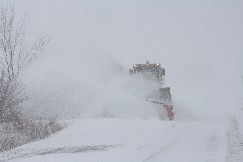
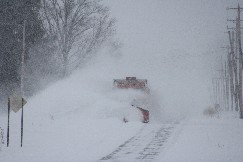
Mailbox ‘snowboards’ are becoming increasingly popular in areas which receive heavy snowfall. The idea is that the snowboard will take the impact of the weight of the snow and ice instead of the mailbox and post. Below is an example of the proper installation of a snowboard.
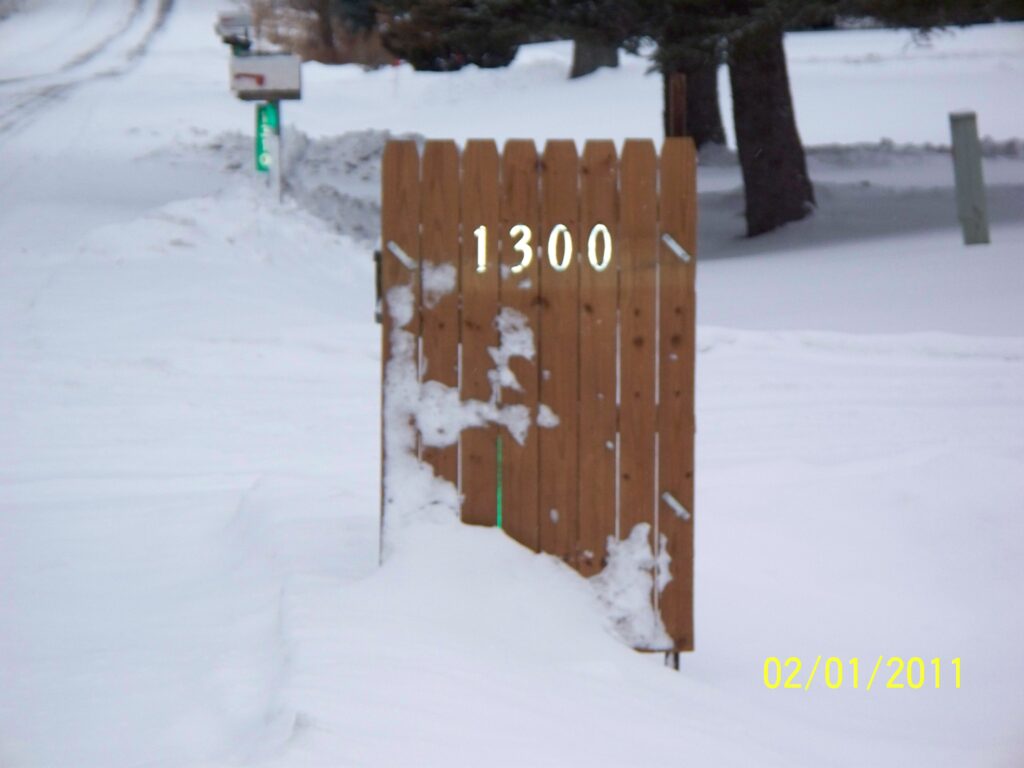
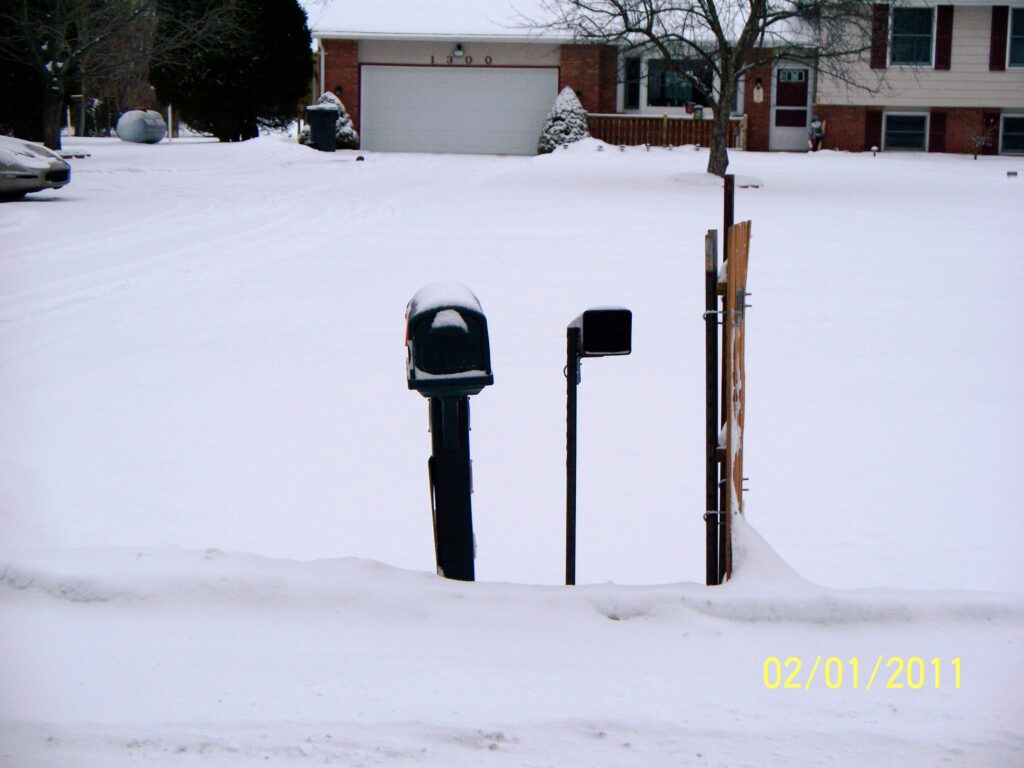
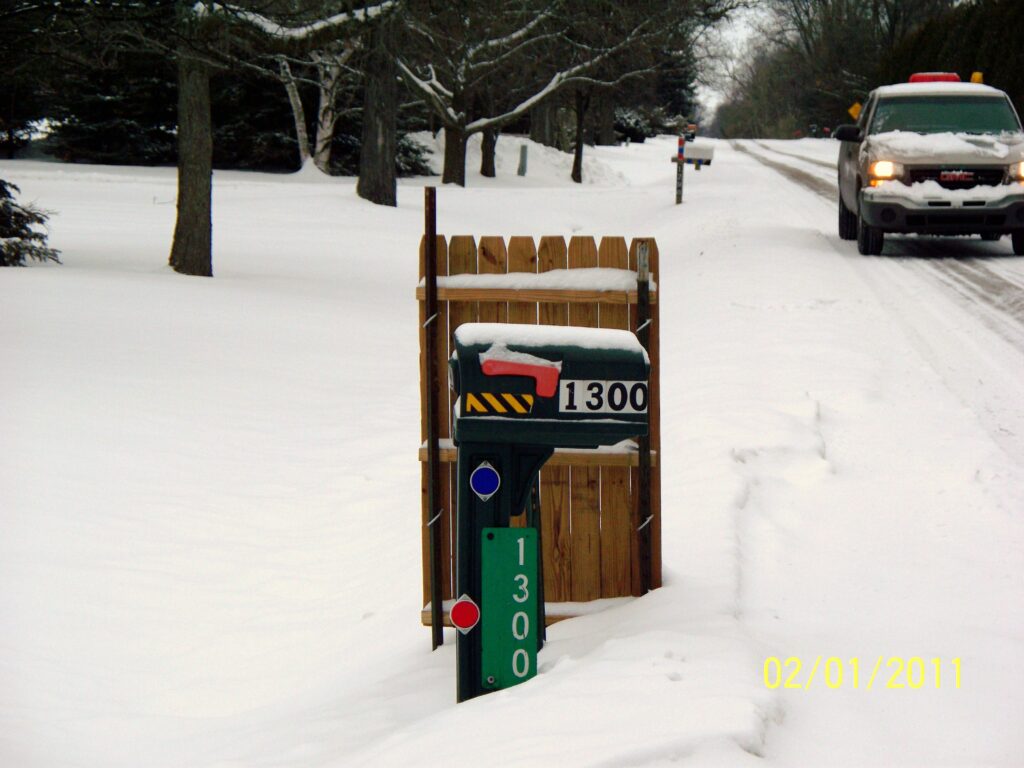
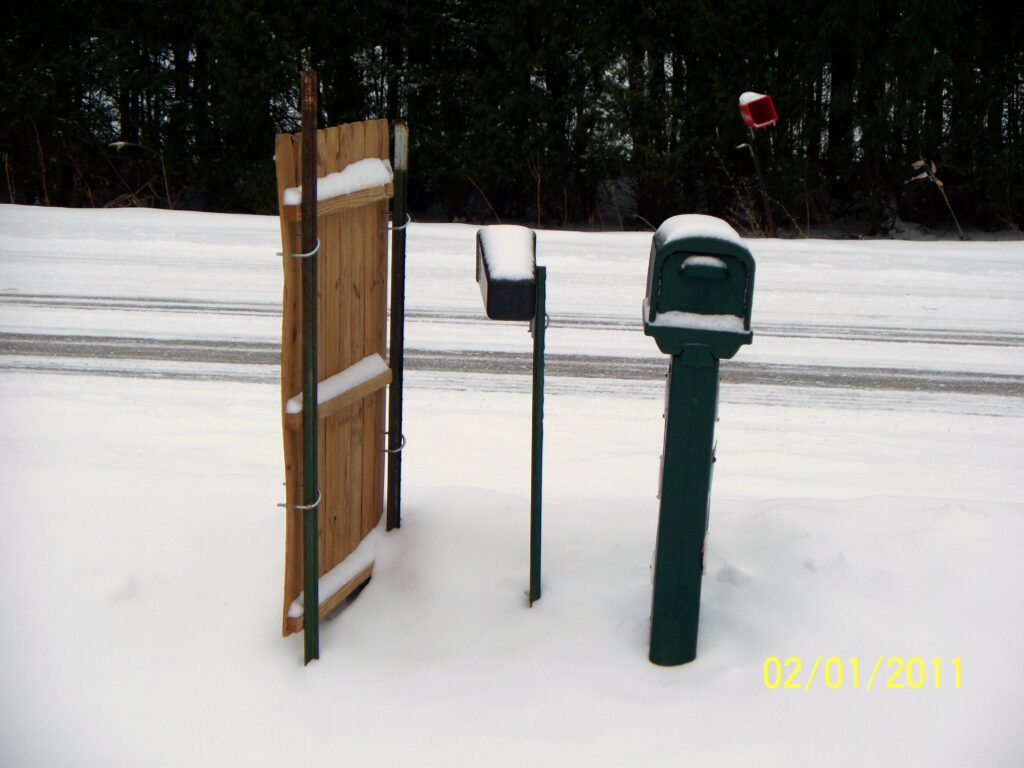
The Board regrets any damage to mailboxes and/or supports that occurs as a result of road maintenance activities. The Board will provide a gift card from Home Depot in the amount of $25.00. The Board offers this even though, by law, is not legally responsible for personal property claims while in the course of its governmental function.
Damaged newspaper boxes and/or their supports will not be replaced by the Board.
